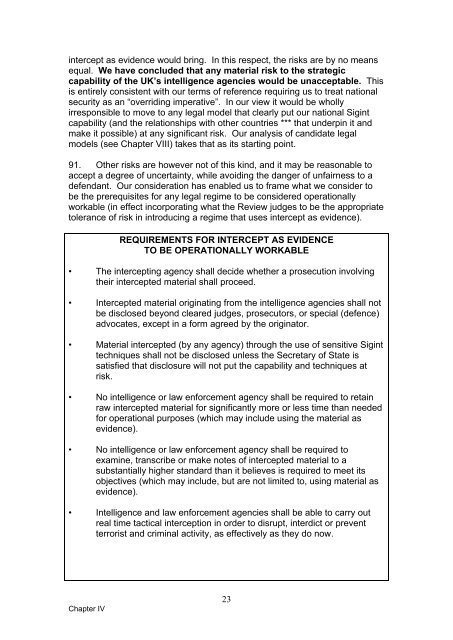Privy Council Review of intercept as evidence: report - Official ...
Privy Council Review of intercept as evidence: report - Official ...
Privy Council Review of intercept as evidence: report - Official ...
You also want an ePaper? Increase the reach of your titles
YUMPU automatically turns print PDFs into web optimized ePapers that Google loves.
<strong>intercept</strong> <strong>as</strong> <strong>evidence</strong> would bring. In this respect, the risks are by no means<br />
equal. We have concluded that any material risk to the strategic<br />
capability <strong>of</strong> the UK’s intelligence agencies would be unacceptable. This<br />
is entirely consistent with our terms <strong>of</strong> reference requiring us to treat national<br />
security <strong>as</strong> an “overriding imperative”. In our view it would be wholly<br />
irresponsible to move to any legal model that clearly put our national Sigint<br />
capability (and the relationships with other countries *** that underpin it and<br />
make it possible) at any significant risk. Our analysis <strong>of</strong> candidate legal<br />
models (see Chapter VIII) takes that <strong>as</strong> its starting point.<br />
91. Other risks are however not <strong>of</strong> this kind, and it may be re<strong>as</strong>onable to<br />
accept a degree <strong>of</strong> uncertainty, while avoiding the danger <strong>of</strong> unfairness to a<br />
defendant. Our consideration h<strong>as</strong> enabled us to frame what we consider to<br />
be the prerequisites for any legal regime to be considered operationally<br />
workable (in effect incorporating what the <strong>Review</strong> judges to be the appropriate<br />
tolerance <strong>of</strong> risk in introducing a regime that uses <strong>intercept</strong> <strong>as</strong> <strong>evidence</strong>).<br />
REQUIREMENTS FOR INTERCEPT AS EVIDENCE<br />
TO BE OPERATIONALLY WORKABLE<br />
• The <strong>intercept</strong>ing agency shall decide whether a prosecution involving<br />
their <strong>intercept</strong>ed material shall proceed.<br />
• Intercepted material originating from the intelligence agencies shall not<br />
be disclosed beyond cleared judges, prosecutors, or special (defence)<br />
advocates, except in a form agreed by the originator.<br />
• Material <strong>intercept</strong>ed (by any agency) through the use <strong>of</strong> sensitive Sigint<br />
techniques shall not be disclosed unless the Secretary <strong>of</strong> State is<br />
satisfied that disclosure will not put the capability and techniques at<br />
risk.<br />
• No intelligence or law enforcement agency shall be required to retain<br />
raw <strong>intercept</strong>ed material for significantly more or less time than needed<br />
for operational purposes (which may include using the material <strong>as</strong><br />
<strong>evidence</strong>).<br />
• No intelligence or law enforcement agency shall be required to<br />
examine, transcribe or make notes <strong>of</strong> <strong>intercept</strong>ed material to a<br />
substantially higher standard than it believes is required to meet its<br />
objectives (which may include, but are not limited to, using material <strong>as</strong><br />
<strong>evidence</strong>).<br />
• Intelligence and law enforcement agencies shall be able to carry out<br />
real time tactical <strong>intercept</strong>ion in order to disrupt, interdict or prevent<br />
terrorist and criminal activity, <strong>as</strong> effectively <strong>as</strong> they do now.<br />
Chapter IV<br />
23
















